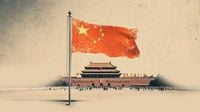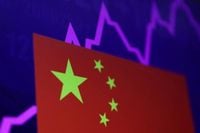On March 27, 2025, China’s Vice Premier Ding Xuexiang delivered a strong message regarding the country's economic outlook, emphasizing a commitment to achieving its full-year growth target amidst a backdrop of rising global uncertainties. In his address, Ding outlined several proactive measures aimed at bolstering the Chinese economy, including the implementation of more aggressive macroeconomic policies.
During the announcement, Ding stated, "We will strive to achieve our full-year growth target," underscoring the government's determination to navigate the challenges posed by the current global economic climate. This sentiment reflects a broader understanding within Chinese leadership of the need to stimulate economic activity as international pressures mount.
Furthermore, Ding noted that the improving trend in China’s economy has become more consolidated, suggesting that recent policies aimed at economic recovery are beginning to bear fruit. He highlighted the need for continuous efforts to ensure that this positive momentum is not only maintained but also expanded.
In a clear stance against rising global protectionism, Ding declared, "We will resolutely oppose protectionism." This statement is particularly significant as many countries around the world grapple with trade tensions and rising nationalist sentiments that threaten to disrupt global markets. By opposing such measures, China aims to position itself as a proponent of free trade and open markets.
However, Ding also acknowledged the challenges posed by a significant rise in uncertainties in the world, indicating that external factors could impact China's economic stability. This acknowledgment is a candid recognition of the interconnected nature of global economies, where shifts in one region can reverberate across the globe.
In light of these challenges, Ding emphasized the importance of fostering the development of private firms, stating that the government would prompt initiatives to support these businesses. This move is seen as essential for diversifying China's economic base and encouraging innovation and competition within the domestic market.
Moreover, Ding expressed a welcoming attitude towards foreign investment, saying, "We welcome foreign companies to invest in China." This statement is a crucial part of China's strategy to attract international capital and expertise, which can play a vital role in enhancing the country's economic landscape.
Market reactions to Ding's announcements have been notably positive. As a direct response to the news, the Australian Dollar (AUD) showed signs of recovery, holding gains near 0.6315, up 0.24% at the time of reporting. This uptick reflects the close economic ties between Australia and China, with the latter being Australia's largest trading partner.
China's economic health significantly influences the value of the Australian Dollar, particularly given that iron ore, Australia’s largest export, is heavily reliant on Chinese demand. In 2021, iron ore accounted for a staggering $118 billion of Australia’s exports, reinforcing the importance of a stable and growing Chinese economy. Therefore, any positive developments in China often lead to increased demand for Australian resources, bolstering the AUD.
The Reserve Bank of Australia (RBA) plays a crucial role in this dynamic, as it sets interest rates that directly affect the Australian economy and, by extension, the value of the AUD. When the RBA maintains relatively high interest rates compared to other major central banks, it supports the AUD's value. Conversely, lower rates can lead to a depreciation of the currency.
Additionally, the health of the Chinese economy impacts Australia’s trade balance, which is the difference between what the country earns from exports and what it spends on imports. A favorable trade balance strengthens the AUD, while a negative balance can weaken it. As such, the interconnectedness of these economies highlights the importance of China's stability and growth for Australia.
Looking ahead, analysts are closely monitoring China's economic performance and the effectiveness of the policies outlined by Vice Premier Ding. The commitment to pro-active macro policies, opposition to protectionism, and encouragement of private sector growth could play pivotal roles in shaping the economic landscape in the coming months.
As global uncertainties continue to rise, the ability of China to maintain its growth trajectory will be crucial not only for its own economy but also for its trading partners, particularly Australia. The interplay between these economies will likely remain a focal point for investors and policymakers alike as they navigate the complexities of an ever-evolving global market.
In conclusion, Ding Xuexiang's recent statements reflect a determined effort by China to solidify its economic position amidst global challenges. By fostering a favorable environment for both domestic and foreign investment, China aims to not only achieve its growth targets but also reinforce its role as a key player in the global economy.





